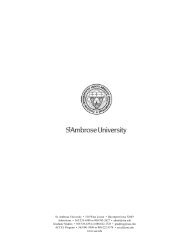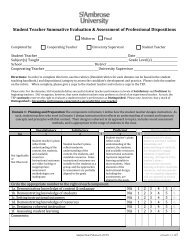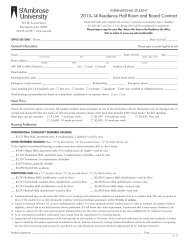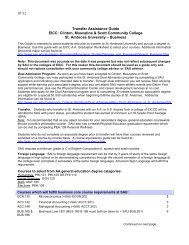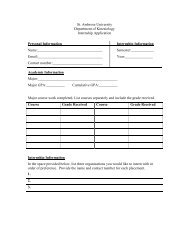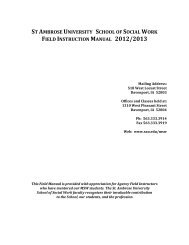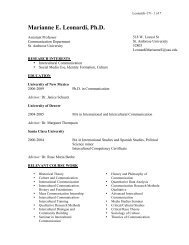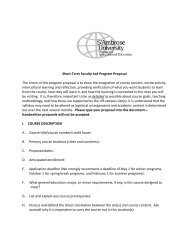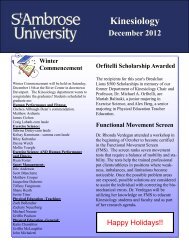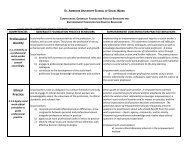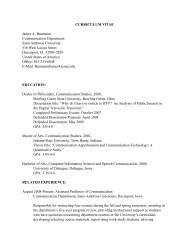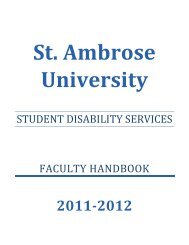St. Ambrose University 518 West Locust Davenport Iowa 52803 admit
St. Ambrose University 518 West Locust Davenport Iowa 52803 admit
St. Ambrose University 518 West Locust Davenport Iowa 52803 admit
You also want an ePaper? Increase the reach of your titles
YUMPU automatically turns print PDFs into web optimized ePapers that Google loves.
Undergraduate Programs<br />
vertebrates including discussion of major extinct<br />
groups. Laboratory includes study of structure of<br />
representative vertebrates and experimental work<br />
with vertebrate animals. Lecture and laboratory.<br />
Prerequisites: BIOL 103, 104.<br />
BIOL 241. Plant Taxonomy<br />
4 credits<br />
Principles of plant classification. Identification of<br />
Midwest vascular flora. Prerequisites: BIOL 103,<br />
104.<br />
WI-BIOL 300. Biological Literature and<br />
Communication<br />
3 credits<br />
Introduction to literature searching, critical reading<br />
and scientific writing in the biological sciences.<br />
Required for biology majors. Prerequisites:<br />
Sophomore standing, a C or better in ENGL 101,<br />
BIOL 103, 104.<br />
BIOL 301. Cell and Molecular Biology 4 credits<br />
Introduction to principles of cell structure and<br />
function with emphasis on eukaryotic cells.<br />
Laboratory focuses on current techniques in cell<br />
and molecular biology. Lecture and laboratory.<br />
Prerequisites: BIOL 104; CHEM 106, 207, 209;<br />
MATH 151 or equivalent.<br />
BIOL 302. Embryology<br />
4 credits<br />
<strong>St</strong>udy of early development of animals, with particular<br />
emphasis on amphibian, avian, mammalian<br />
and human development. Lecture and laboratory.<br />
Prerequisites: BIOL 103, 104.<br />
BIOL 303. Genetics<br />
4 credits<br />
Principles of heredity including classical and molecular<br />
genetics. Lecture and laboratory.<br />
Prerequisites: BIOL 103, 104; CHEM 105;<br />
MATH 151 or equivalent.<br />
BIOL 304. Animal Histology<br />
4 credits<br />
Microscopic study of tissues and organs including<br />
laboratory techniques involved in preparation<br />
of slides. Lecture and laboratory. Prerequisites:<br />
BIOL 103, 104.<br />
+ = Applicable toward general education degree requirements<br />
WI = Writing intensive course<br />
WI-BIOL 307. Ecology<br />
4 credits<br />
Principles involved in the interaction of naturally<br />
occurring populations of plants and animals with<br />
their physical and biological environments.<br />
Lecture and laboratory. Prerequisites: BIOL 103,<br />
104; CHEM 105; MATH 151 or equivalent;<br />
SSCI 213.<br />
BIOL 310. Midwestern Ecosystems 3 credits<br />
A field-oriented examination of regional ecosystems<br />
and how they have changed through geological<br />
and historical time. Prerequisites: BIOL 103,<br />
104.<br />
BIOL 314. Animal Physiology 4 credits<br />
<strong>St</strong>udy of mechanisms of animal function. Lecture<br />
and laboratory. Prerequisites: BIOL 103, 104;<br />
CHEM 105, 106, 207, 209; MATH 151 or<br />
equivalent.<br />
BIOL 316. Toxicology<br />
3 credits<br />
Introduction to nomenclature, principles, and<br />
scope of toxicology. The fate and effects of both<br />
organic and inorganic toxicants in the environment,<br />
in animals and in various test systems.<br />
Lecture and discussion. Prerequisites: BIOL 103,<br />
104; CHEM 105, 106. (Same as ENVR 316)<br />
BIOL 321. Special Topics in Field Biology and<br />
Ecology<br />
2–3 credits<br />
Extended field investigations of major North<br />
American biomes. Two-week field trip required.<br />
Prerequisites: One semester of college-level biology<br />
and permission of instructor.<br />
BIOL 323. Special Topics<br />
2–3 credits<br />
Investigation of selected biology sub-disciplines<br />
not treated in the department’s regular offerings.<br />
BIOL 330. Recombinant DNA<br />
Techniques<br />
4 credits<br />
Instruction and experience in the manipulation<br />
and study of genetic material. Introduction to<br />
some instruments and techniques used in a modern<br />
molecular biology laboratory. Prerequisites:<br />
BIOL 103, 104, or instructor permission.<br />
64



